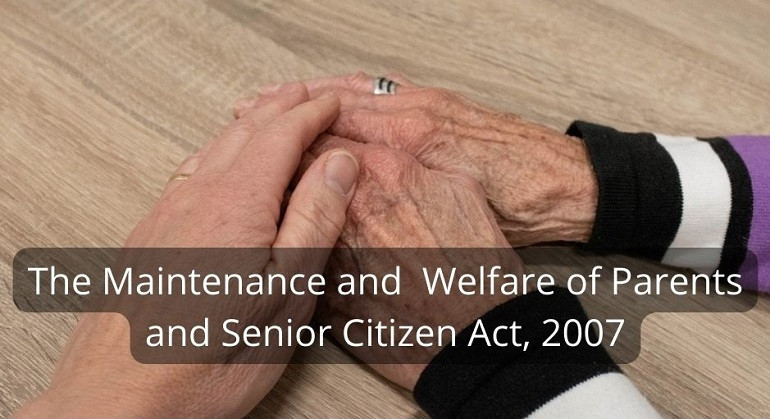

The Maintenance and Welfare of Parent and Senior Citizen Act, 2007
SENIOR CITIZENS ACT
In India, institution of families that too joint family has always given a huge importance. We, being value-oriented country proclaim senior citizens to be next to God. Respecting and taking care of old age people is core of our Indian Culture. But the irony is that senior citizens being so essential part of our culture, laws and regulations needs to be taken care off to exercise their rights.
Following are some legislations in our country for the betterment of senior citizens:
- Maintenance And Welfare of Parents and Senior Citizens Act, 2007
- Maintenance and Welfare of Parents and Senior Citizens (Amendment) Bill, 2019
Some policies have also been introduced so far .They are
- National Policy for Older Persons, 1999
- National Policy for Senior Citizens, 2011
- Section 125 of the Criminal Procedure Code, 1908-parents can claim maintenance against their children including married daughters.
Now let’s analyze the major legislations for maintenance and betterment of senior citizens
MAINTENANCE AND WELFARE OF PARENTS AND SENIOR CITIZENS ACT, 2007
Only after the enactment of the Act in India, prominence for protection of senior citizens were given. Most significant thing about this act is that children, grandchildren as well as close relatives in certain cases are responsible for providing maintenance to their parents and their grand-parents so that they can lead a good and dignified life. Senior citizens can claim maintenance only in case where they (relatives) possess their property or can inherit their property.
This Act empowers Senior citizens to approach the Court/ Tribunal established under this Act for claiming maintenance, by filing applications against the mentioned persons liable to pay them. Tribunal after seeing all the pros and cons of the circumstance can pass an order accordingly.
Not only this relief is given by this Act, it also ensures protection of property of Senior Citizens. It is often seen that children or grand-children inherit or transfer their parents property in their name and promises them to provide maintenance and facilitate them a good life, but after getting property transferred in their name the picture goes up-side down. They do not take care of them. In such a case, senior citizens instead of running from post to pillar at this phase of their life can knock the doors of the Court and get their properties revoked, declaring it as void citing reasons of fraud, undue influence or coercion.
MAINTENANCE AND WELFARE OF PARENTS AND SENIOR CITIZENS (AMENDMENT) BILL, 2019
Even after the enactment of the above Act, several issues regarding senior citizens were left unaddressed. Therefore, a need arose for some amendments in the original Act. Special thing about this new bill introduced in 2019 is that it contains the provisions related to punishment for abusing and abandoning the parents. It specifically provides imprisonment for a term of six months or with a fine of rupees ten thousand or both.
It also contains provisions for speedy disposal of applications filed by senior citizens for claiming maintenance and seeking assistance. It directs to dispose applications within 60 days incase of senior citizens of 80 years and above age group. For rest age group it is directed to be disposed the application within 90 days. Moreover, it is to be noticed that maintenance in original Act does not include safety and security along with basic necessities like food, shelter, clothing and health care obligations but this Bill includes. So, scope of maintenance is widened now.
Further, there is no upper limit for the maintenance as per the new bill, which is to be paid within 15 days of application by the children now, failing which the concerned authorities will impose fine on the children. If they fail to give in any case then 1 month imprisonment or imprisonment till they pay maintenance is imposed.



